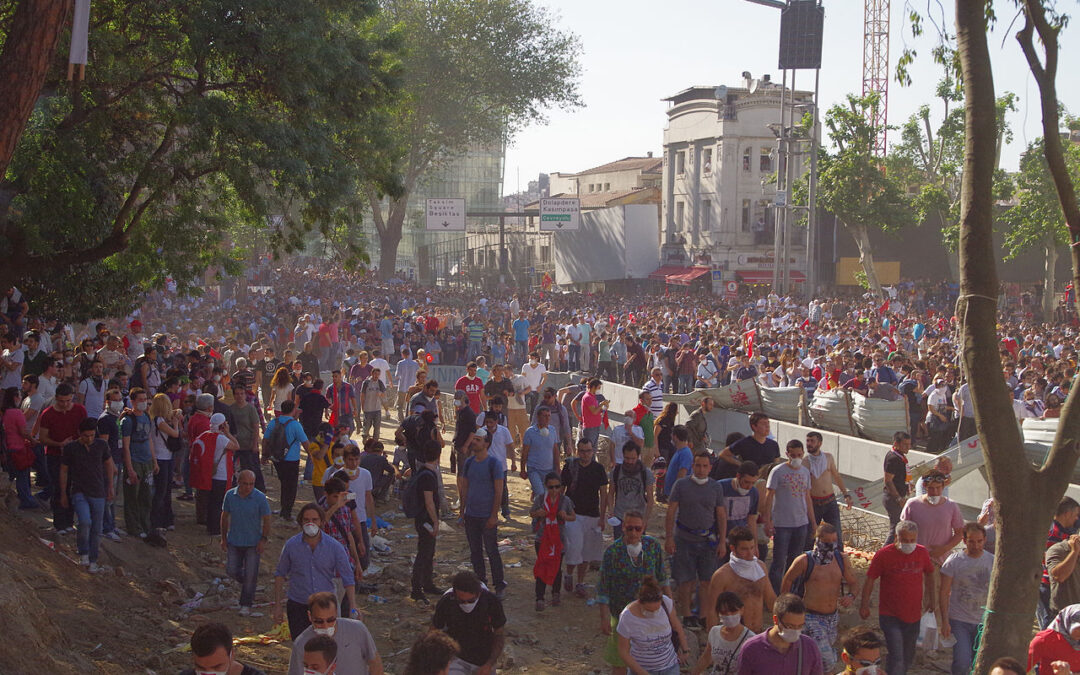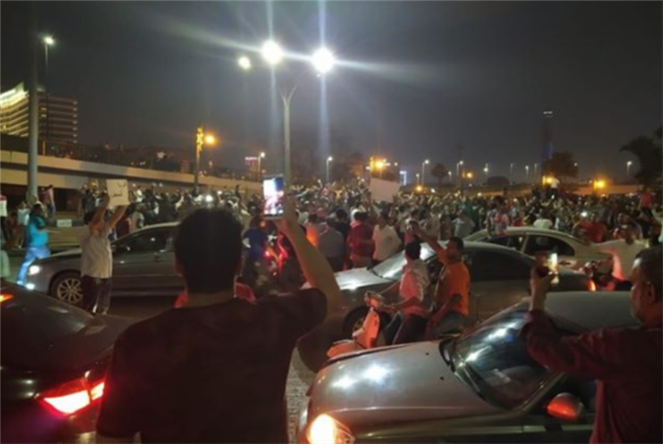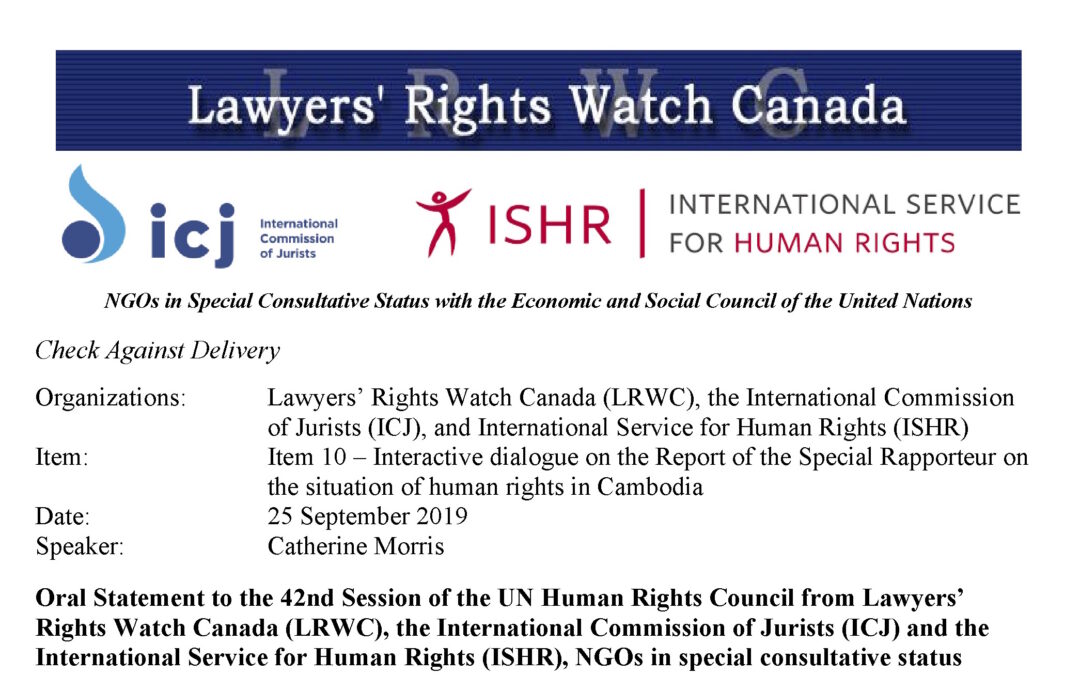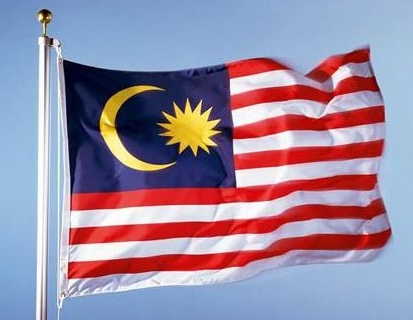
Oct 14, 2019 | Multimedia items, News, Video clips
The conviction today of Catalan separatist leaders of broadly defined offences of sedition unduly restricts rights of freedom of expression, assembly and association, the ICJ said today.
“These convictions represent a serious interference with the exercise of freedom of expression, association and assembly of the leaders. The resort to the law of sedition to restrict the exercise of these rights is unnecessary, disproportionate and ultimately unjustifiable” said Massimo Frigo, ICJ Europe and Central Asia Senior Legal Adviser.
The ICJ also stressed that the overly broad definition of the crime of sedition applied in this case creates a high risk of arbitrariness.
“We are concerned that the Supreme Court does not comply with Spain’s obligations under international human rights law in the consideration of the charges against these defendants and this seriously undermines these convictions,” he added.
Nine of the twelve leaders on trial – including high-ranking Catalan government officials –were convicted of sedition in connection with their part in the administration on 1 October 2017 of a referendum on Catalonian independence. The referendum was conducted despite having been declared illegal by the Constitutional Court.
The voting process during the referendum was forcibly suppressed in many locations by the police, with credible reports of the use of unnecessary and disproportionate force in breach of Spain’s international law obligations.
“Interference with peaceful political expression and protest is not acceptable, save in limited circumstances where it is strictly necessary and proportionate for compelling purposes such as national security .” Frigo said.
Contact
Massimo Frigo, Senior Legal Adviser, ICJ Europe Programme, t: +41 22 979 38 05 ; e: massimo.frigo(a)icj.org
Background
The 12 people convicted in connection with the October 2017 referendum include Oriol Junqueras (13 years of imprisonment for sedition and abuse of power), former Catalan vice-president; Carme Forcadell, former Catalan parliament speaker (11 years and six months of imprisonment for sedition); eight former ministers in the Catalan government – Jordi Turull (12 years of imprisonment for sedition and abuse of power), Raül Romeva (12 years of imprisonment for sedition and abuse of power), Joaquim Forn (10 years and six months of imprisonment for sedition), Santiago Vila (10 months for disobedience), Meritxel Borràs (10 months for disobedience), Dolors Bassa (12 years of imprisonment for sedition and abuse of power), Josep Rull (10 years and six months of imprisonment for sedition), Carles Mundó (10 months for disobedience); Jordi Sànchez (9 years of imprisonment for sedition) the former leader of the Catalan National Assembly (ANC); and Jordi Cuixart (9 years of imprisonment for sedition), former head of the independence organisation Òmnium Cultural.
Spain has obligations to protect freedom of expression, including political expression, under Article 10 of the European Convention on Human Rights (ECHR) and Article 19 of the International Covenant on Civil and Political Rights (ICCPR); and freedom of peaceful assembly and association under Article 11 ECHR and Article 21 and 22 ICCPR.
The Human Rights Committee in its General Comment on freedom of expression has affirmed that: “extreme care must be taken by States parties to ensure that treason laws and similar provisions relating to national security, whether described as official secrets or sedition laws or otherwise, are crafted and applied in a manner that conforms to the strict requirements of paragraph 3” of article 19 ICCPR, which requires that restrictions on freedom of expression be provided for by law and must be necessary for a legitimate purpose, such as national security or public order .) Rights to participate in public life are protected under Article 25 ICCPR.

Oct 8, 2019 | News
The ICJ and the International Bar Association’s Human Rights Institute (IBAHRI) have jointly sent an international observer to attend the third hearing of the criminal trial on the “Gezi Park” protest at the Silivri Prison Courthouse in Istanbul, scheduled to take place on 8 and 9 October 2019.
The ICJ and IBAHRI observer will be monitoring a trial hearing before İstanbul 30th Assize Court with prinicipal defendant Osman Kavala, and 15 others; Ali Hakan Altınay, Ayşe Mücella Yapıcı, Ayşe Pınar Alabora, Can Dündar, Çiğdem Mater Utku, Gökçe Yılmaz, Handan Meltem Arıkan, Hanzade Hikmet Germiyanoğlu, İnanç Ekmekci, Memet Ali Alabora, Mine Özerden, Şerafettin Can Atalay, Tayfun Kahraman, Yiğit Aksakoğlu and Yiğit Ali Ekmekçi.
The observer will report directly to the IBAHRI and ICJ Secretariats on the proceedings following the mission.
The Gezi Park protests began in May 2013 as an effort by a group of environmentalists to save a park in central Istanbul from being rezoned, but soon turned into nationwide demonstrations.
The protest was quelled by police with the use of tear gas and water cannons against the protesters in Taksim Square. Following a six-year investigation into the events, the 657-page indictment issued by the Istanbul Chief Public Prosecutor’s Office was accepted by the 30th A Court in Istanbul on 4 March 2019.
The defendants are to be charged under Turkish Criminal Code Article 312 (attempt to overthrow the Turkish Government or attempt to prevent it from fulfilling its duties), Article 151 (damage to property), Article 152 (qualified damage to property), Article 174 (possession or exchange of hazardous substances without permission), Article 153 (damaging places of worship and cemeteries), Article 149 (qualified robbery), Article 86 (intentional injury); crimes under the Law on Firearms, Knives and Other Tools no. 6136, and crimes under the Law on Protection of Cultural and Natural Assets no. 2863.
The total sentence asked for by the prosecution for these offences amounts to approximately 47,520 years imprisonment.
Contact:
Massimo Frigo, Senior Legal Adviser, t: +41 22 979 38 05 – e: massimo.frigo(a)icj.org

Sep 27, 2019 | News
The ICJ today called on the Egyptian authorities to respect and protect the right of Egyptians to the freedom of expression, association and assembly, and ensure that all those arbitrarily detained over the past week in the context of recent protests against President Abdel Fattah Al-Sisi’s rule are immediately and unconditionally released.
On 26 September, the Office of the Public Prosecutor issued a statement confirming the detention of more than 1000 people following their “participation in protests” and “confessions” that their participation is related to “their dissatisfaction with the economic situation in the country,” and “opposition to the regime.”
Documentation by local NGOs indicates that as many as 2000 people may have been arrested, and that most of them were charged with “belonging to a ‘terrorist group’ and “distributing false information through social media aiming at disturbing the public order and opinion.”
“Egyptians taking to the street in protest are defying six years of Sisi’s government rampant corruption, relentless repression, and systematic dismantling of the rule of law and accountability safeguards,” said Said Benarbia, ICJ MENA Director.
Benarbia added, “By filling prisons with those purportedly dissatisfied with the situation in the country, Egypt’s prosecutors and judges are acting, yet again, as a docile tool of repression rather than a shield against the military’s crackdown on human rights and fundamental freedoms.”
As the country braces for new protests today, the ICJ is deeply concerned that Egyptian laws place overly restrictive limitations on the exercise of the right to freedom of assembly and give security forces sweeping powers to disperse protests, including by using lethal force when it is not strictly necessary to protect lives.
Six years after the killing by the armed and security forces of more than 1,000 individuals in the context of the dispersal of the Rabaa’ Al-Adawyia and Al Nahda Square sit-ins, the ICJ notes that not a single person has been brought to justice for the mass killings of protestors.
“Egyptian security and armed forces have a long history of recourse to unlawful and disproportionate use of force, including firing with live ammunition into crowds,” said Benarbia.
“They must comply with Egypt’s obligations under international law and guarantee the rights of protesters to life, to be free from torture and other ill-treatment, and to freedom of assembly, association and expression,” added Benarbia.
Contact:
Said Benarbia, Director of the ICJ Middle East and North Africa Programme, t: +41-22-979-3817; e: said.benarbia(a)icj.org
Download:
Egypt-free detainees-News-Press releases-2019-ARA (press release in Arabic, PDF)

Sep 25, 2019 | Advocacy, Non-legal submissions
The ICJ today joined other NGOs in drawing the UN Human Rights Council’s attention to the role of the Government of Cambodia in widespread human rights violations and abuses in the country, and called for renewal of the mandate of the UN Special Rapporteur.
The joint NGO statement was delivered by Lawyers’ Rights Watch Canada in a dialogue on the situation in Libya. The statement read as follows:
“Lawyers’ Rights Watch Canada (LRWC), the International Commission of Jurists (ICJ), and the International Service for Human Rights (ISHR) thank the Special Rapporteur for her reports. Implementation of the Sustainable Development Goals, ensuring that no one is “left behind,” necessitates equal access to remedies for rights violations within a trustworthy and independent legal system.
Cambodia has not fulfilled its treaty obligations to establish judicial independence and integrity. Civil society’s rights advocacy is continually resisted. Lawyers, defenders, journalists, politicians, or activists reporting on corruption, election irregularities, labour rights violations, illegitimate land acquisition, environmental degradation, or other rights abuses, often by businesses, are routinely subjected to official vilification; intimidation; interference with rights to expression, association, and assembly; criminalization; arbitrary detention; and even unlawful killings with impunity.
Since 2017, political opposition has been systematically suppressed, including through misuse of the judiciary. Despite the Special Rapporteur’s repeated calls for release of opposition leader Kem Sokha, he remains under court-imposed restrictions tantamount to house arrest. The Special Rapporteur has been denied visits with him contrary to Special Procedures terms of reference for country visits. In May, 25 former opposition members were summoned to court for questioning over two weeks. In September, the government threatened to arrest anyone supporting opposition politician Sam Rainsy’s return to Cambodia.
Cambodia’s responses to Special Procedures’ recommendations for the past twenty-five years have been characterized by disregard, delay, resistance, or hostility. Continued support for the Special Rapporteur’s mandate is critical to ensure that Cambodia fulfils its international human rights obligations. We request that the Council extend the mandate.”
The full written statement, including references, can be downloaded in PDF format here: UN-HRC42-Cambodia-2019

Sep 10, 2019 | News
ICJ expressed concern over the decision given on 27 August 2019 by the Malaysian High Court that a fatwa issued against the women’s organization, Sisters in Islam, should be referred to the Syariah Court.
The High Court used as a basis Article 121 (1A) of the Federal Constitution, which states that secular courts do not have jurisdiction over matters pertaining to Islam.
The ICJ called on the Malaysian authorities to ensure that custom, tradition, and religion should not be used as a justification to undermine human rights, including women’s human rights.
In 2014, the Selangor Fatwa Council issued a fatwa declaring the Sisters in Islam a “deviant organization.” For many years, Sisters in Islam has been promoting more egalitarian interpretations of Islamic laws with the aim of ending discrimination against women and achieving equality in the Muslim family.
“For women to fully exercise their religious freedom, they must be able to retain or adopt the religion of their choice, and they must be able to continue belonging to this religion without being discriminated against within the religion,” said Emerlynne Gil, ICJ’s Senior International Legal Adviser.
The ICJ stressed that under international law, States have an obligation to protect people who are prevented from exercising their religious freedom by private actors, such as their own religious communities.
“The Malaysian government, including the judiciary, has the obligation to protect groups like Sisters in Islam when they face persecution from within their religious communities for propounding alternative views about their religion,” said Emerlynne Gil.
Furthermore, the ICJ had previously underscored in a 2019 briefing paper on the challenges to Freedom of Religion or Belief in Malaysia, the tensions emerging from jurisdictional disputes between civil courts, which apply federal and state laws, and Syariah courts, which apply Islamic laws.
In 2018, the UN Committee on the Elimination of Discrimination against Women, in reviewing the performance of Malaysia, voiced its own concern over “the existence of a parallel legal system of civil law and multiple versions of Syariah law, which have not been harmonized in accordance with the Convention on the Elimination of All Forms of Discrimination Against Women (CEDAW).” The CEDAW Committee concluded that this “leads to a gap in the protection of women against discrimination, including on the basis of their religion.
Contact:
Emerlynne Gil, Senior International Legal Advisor, ICJ, e: emerlynne.gil(a)icj.org









